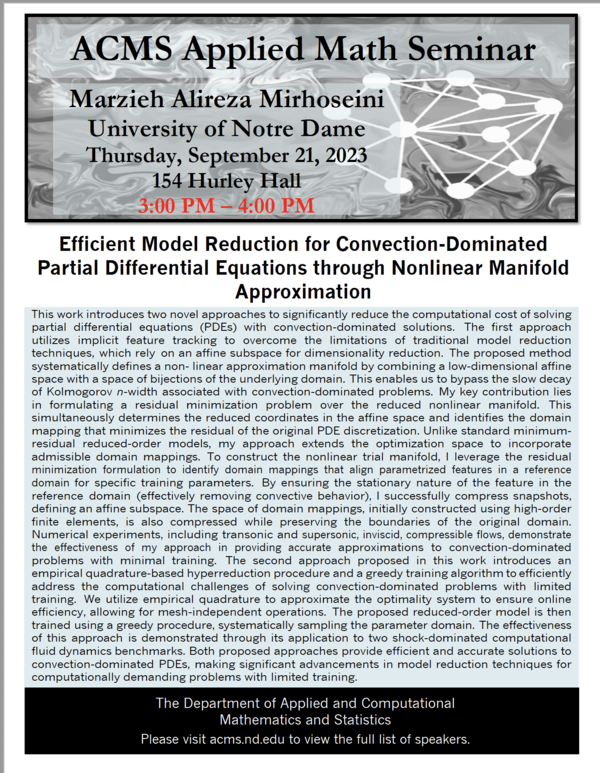Marzieh Alireza Mirhoseini
University of Notre Dame
Thursday, September 21, 2023
154 Hurley Hall
3:30 pm - 4:30 pm
Title: Efficient Model Reduction for Convection-Dominated Partial Differential Equations through Nonlinear Manifold Approximation
Abstract: This work introduces two novel approaches to significantly reduce the computational cost of solving partial differential equations (PDEs) with convection-dominated solutions. The first approach utilizes implicit feature tracking to overcome the limitations of traditional model reduction techniques, which rely on an affine subspace for dimensionality reduction. The proposed method systematically defines a non- linear approximation manifold by combining a low-dimensional affine space with a space of bijections of the underlying domain. This enables us to bypass the slow decay of Kolmogorov n-width associated with convection-dominated problems. My key contribution lies in formulating a residual minimization problem over the reduced nonlinear manifold. This simultaneously determines the reduced coordinates in the affine space and identifies the domain mapping that minimizes the residual of the original PDE discretization. Unlike standard minimum-residual reduced-order models, my approach extends the optimization space to incorporate admissible domain mappings. To construct the nonlinear trial manifold, I leverage the residual minimization formulation to identify domain mappings that align parametrized features in a reference domain for specific training parameters. By ensuring the stationary nature of the feature in the reference domain (effectively removing convective behavior), I successfully compress snapshots, defining an affine subspace. The space of domain mappings, initially constructed using high-order finite elements, is also compressed while preserving the boundaries of the original domain. Numerical experiments, including transonic and supersonic, inviscid, compressible flows, demonstrate the effectiveness of my approach in providing accurate approximations to convection-dominated problems with minimal training. The second approach proposed in this work introduces an empirical quadrature-based hyperreduction procedure and a greedy training algorithm to efficiently address the computational challenges of solving convection-dominated problems with limited training. We utilize empirical quadrature to approximate the optimality system to ensure online efficiency, allowing for mesh-independent operations. The proposed reduced-order model is then trained using a greedy procedure, systematically sampling the parameter domain. The effectiveness of this approach is demonstrated through its application to two shock-dominated computational fluid dynamics benchmarks. Both proposed approaches provide efficient and accurate solutions to convection-dominated PDEs, making significant advancements in model reduction techniques for computationally demanding problems with limited training.
